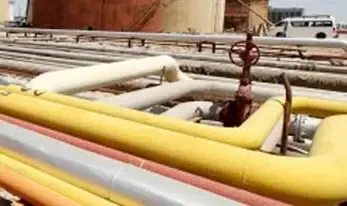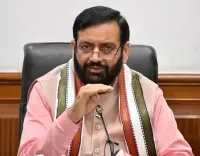Concerns Rise in Eastern and Central Europe Following Ukraine's Suspension of Russian Gas Transit

Vienna, Jan 2 (NationPress) On a chilly morning in Slovakia's capital Bratislava, cameraman Peter Lahky voiced his worries about a potential energy crisis after Ukraine halted the transit of Russian gas to Europe, fearing that escalating energy costs would further strain his finances.
Lahky shared with Xinhua that he is increasingly anxious about the recent predictions made by Slovakia's Regulatory Authority for Network Industries, which is the country's energy regulator. They forecast household gas prices could surge by 15 to 34 percent by 2025 without government energy support.
This projection implies that his family might need to allocate an additional 300 euros (approximately 310 US dollars) for gas in 2025 compared to 2024, and it remains uncertain whether the Slovak government will continue to provide energy assistance in the coming year.
"It's not a small amount, so I'll be more cautious with my spending," he remarked.
Lahky's apprehensions resonate with many others in central and eastern Europe, a region that has historically depended heavily on Russian gas supplies but now faces the challenge of finding more expensive alternatives after both Ukraine and Russia declared a halt to the transit of Russian gas through Ukraine.
The suspension followed Ukraine's decision not to renew a gas transit agreement with Russia's Gazprom, originally signed by its state-run Naftogaz, which expired on December 31, 2024.
Statistics indicate that in 2023, approximately 15 billion cubic meters of Russian gas were transported through Ukraine to Europe, which accounted for around 5 percent of Europe's overall gas requirements. The TurkStream pipeline under the Black Sea is now the only remaining conduit for transporting Russian gas to Europe.
This cessation of gas transit is significantly impacting Moldova, which relied on about 2 billion cubic meters of gas imported from Russia via Ukraine annually. Residents are not only anxious about soaring gas prices but also about potential energy shortages.
Tirasteploenergo, an energy firm in Moldova's Transnistria region, announced the suspension of heating and hot water services due to a "temporary cessation of gas supplies" to its heat-generating facilities, with exceptions made for healthcare facilities and residential care institutions.
The company indicated that it might take up to two weeks to restore services and advised customers to seal gaps around windows and balcony doors to conserve heat and to gather all family members in a single room, as reported by Xinhua.
In mid-December, the Moldovan government had already declared a 60-day national state of emergency to manage risks stemming from an anticipated cut-off of Russian gas supplies.
Starting Wednesday, the Moldovan government also initiated measures to reduce electricity consumption by at least 30 percent, which includes limiting street lighting, halting the operation of escalators in certain public and commercial buildings, and adjusting working hours for high-energy-consuming sectors.
Moldova has also planned to enhance electricity imports from Romania and signed a memorandum with Bulgaria for emergency gas assistance.
Tatiana Savva, a finance and public policy analyst, expressed in an opinion piece on Moldova.org that excessive energy costs have long been a burden on Moldovan households and businesses, deterring investments; without a swift resolution to the ongoing crisis, the economic fallout could lead to stagnation in strategic investments, reduced economic activity, and diminished competitiveness in the local market.
Conversely, in the more affluent Austria, public sentiment appears more hopeful as the government has consistently assured citizens that the country has prepared adequately with sufficient gas reserves and has made comprehensive plans to transition to alternative suppliers.
Leo Lehr, Deputy Head of the economics department at Austria's energy regulatory body E-Control, informed local media that he does not foresee significant increases in gas prices akin to those in 2022, as the cessation of Russian gas supplies via Ukraine had been anticipated; however, he cautioned that gas prices could experience increased volatility at the start of this year.








